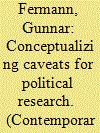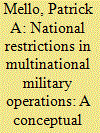| Srl | Item |
| 1 |
ID:
166604


|
|
|
|
|
| Summary/Abstract |
The upsurge in post-Cold War coalition operations has stimulated research on caveats: national reservations on the use of force in multinational military operations. However, because the concept of caveats has no agreed-upon definition, it is used inconsistently. This in turn impedes comparing research findings across academic and policy studies and therefore systematic research. This article is a contribution to the scholarly debate on how the analytical concept of caveats are to be delimited. Crucially, we argue that caveats result from some calculated political decision, and should not be confused with reserved behavior due to financial and technical limitations, or lack of coordination. We suggest that caveats are empirically observed and measured in two ways: First, we argue that coalition rules of engagement should be used as a yardstick for measuring direct reservations on the use of force. Second, we suggest reservations on task-assignment and geographical mobility should be used to register indirect reservations.
|
|
|
|
|
|
|
|
|
|
|
|
|
|
|
|
| 2 |
ID:
166603


|
|
|
|
|
| Summary/Abstract |
Recent scholarship in security studies has started to explore the causes and consequences of various forms of national restrictions in multinational military operations (MMOs). This article makes a conceptual contribution to this literature by developing a theoretical framework of national restrictions in MMOs that distinguishes between structural, procedural, and operational restrictions. I argue that these types of restrictions are governed by different causal mechanisms. Structural restrictions are relatively stable over time and effect deployment decisions irrespective of other factors. Procedural restrictions, on the other hand, can constitute veto points against deployment only in combination with distinct political preferences. Finally, operational restrictions directly affect the rules of engagement of troop contributing countries. The article illustrates the three types of restrictions and their interaction with empirical examples from a range of countries and sketches their impact on MMO deployment decisions and mandates.
|
|
|
|
|
|
|
|
|
|
|
|
|
|
|
|